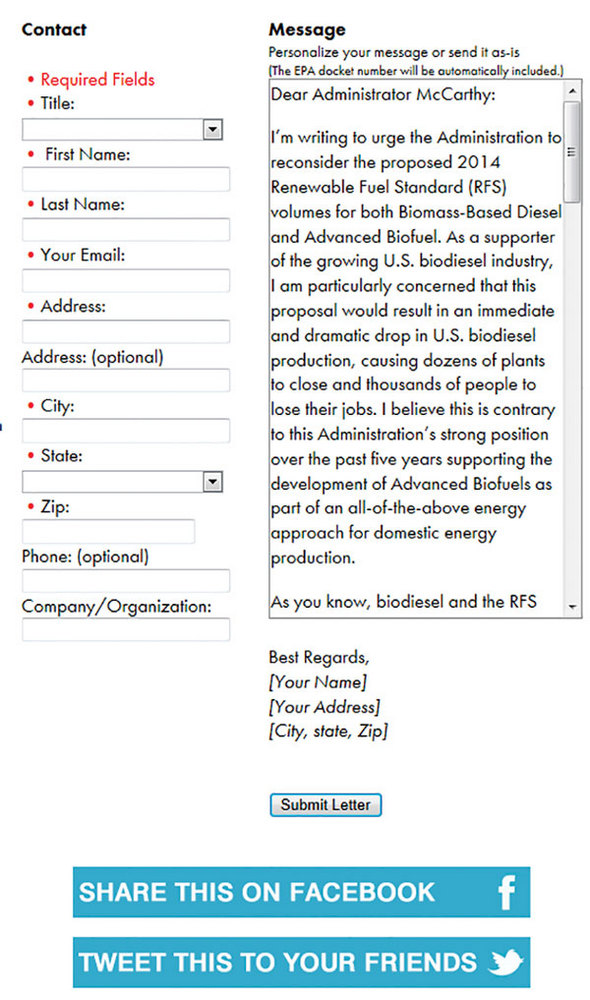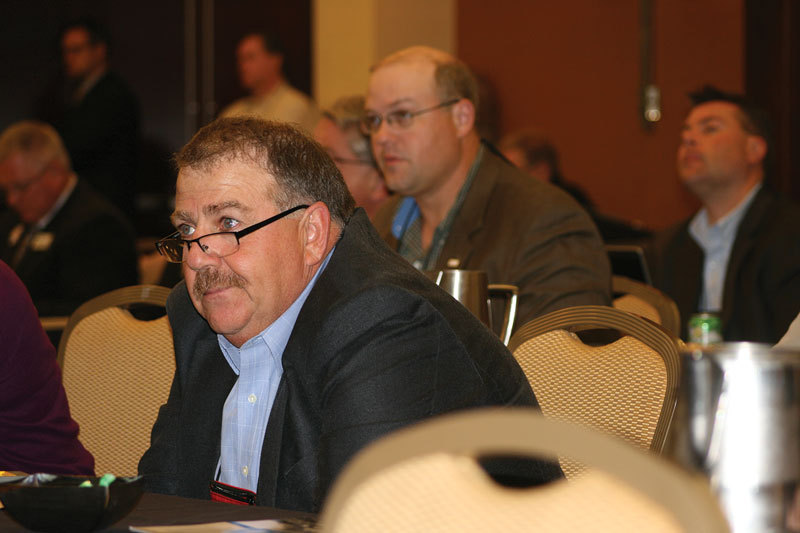Coming Off Record Year, RFS Proposal Poses Significant Challenge





January 10, 2014
BY Joe Jobe
The biodiesel industry has faced its share of challenges. If you have been around the industry very long, you might say we have faced more than our fair share. But one thing is certain, when we face challenges, even if they seem monumental, we come together and we succeed.
We are officially on the clock for what may be our biggest challenge faced to date. On Nov. 29, the EPA formally published its proposed rule for 2014 and 2015 biodiesel volumes under the RFS. This started the 60-day comment period and sets a deadline of Jan. 28 to make our voices heard on this damaging proposal.
The U.S. biodiesel industry is the leading producer of EPA-designated advanced biofuel, and the first to break 1 billion gallons of annual production. With commercial-scale refineries across the country, the industry has exceeded RFS requirements in each year of the program including 2013 with an all-time record production estimated at 1.7 billion gallons. Biodiesel is a clear RFS success story and the industry is calling on the EPA to support a modest increase in the proposal that is consistent with actual, real-world production.
The EPA’s proposed rule for next year would set biodiesel volumes at 1.28 billion gallons while shrinking the overall advanced biofuel requirement to 2.2 billion gallons. Additionally, because excess biodiesel production in 2013 can be carried over for compliance into 2014, the 1.28 billion gallon proposal for 2014 could mean an effective market closer to 1 billion gallons—a dramatic reduction from current production levels.
Advertisement
Advertisement
Because this proposal has the potential to do serious damage to the industry, we are doing everything we can, but we need your help. We will not be successful without vocal and aggressive outreach from the industry. We have set a goal of submitting at least 5,000 letters supporting an increased biodiesel volume above the 1.28 billion gallon proposal. We have made it easy by embedding a form letter at the Fueling Action Letter Writing Campaign page linked from the homepage of www.biodiesel.org. The message can be edited to include your personal story, or it can be sent as is. It can be sent throughout your social media networks, shared with friends and family during the holidays, or left open on a computer in the break room for employees to send directly from your facility.
Along with a high volume of letters, we know that a wide variety of individual letters from stakeholders is extremely important. We urge you to customize letters to discuss the specific impacts lower biodiesel production numbers will have on your business, job, or organization. You can use the template letter online and submit just by clicking “Send,” or you can use one of the following methods to send it manually. If sending manually, be sure to direct your submission to Docket ID No. EPA-HQ-OAR-2013-0479:
• Submit via email to a-and-r-docket@epa.gov; Mccarthy.gina@epa.gov;
HShelanski@omb.eop.gov; dmancini@omb.eop.gov; oecc@who.eop.gov; agsec@usda.gov.
• Submit electronically from www.regulations.gov and searchfor Docket ID No. EPA-HQ-OAR-2013-0479.
You will seea link for Renewable Fuel Standard Program; 2014 Standards and click the “Comment
Now” link on the righthand side.
• Submit via mail to Air and Radiation Docket and Information Center, Environmental Protection
Agency, Mailcode: 2822T, 1200 Pennsylvania Ave. NW., Washington, DC 20460.
We would like to be able to track our progress throughout the 60-day comment period so if you do send a letter, or your friends submit 50 letters, please let Ben Evans know at bevans@biodiesel.org.
Advertisement
Advertisement
Another tactic that we know will be crucial to the effort is to have senators and representatives weigh in with the EPA and the administration on behalf of the industry. In November, we saw a bipartisan group of 32 senators sign a letter urging administration support led by industry champions Sens. Franken, Blunt, Murray and Grassley. On the House side, Reps. Mike McIntyre and Tom Latham circulated a similar support letter that was sent to the administration in December. We know that this show of support from Congress has made an impact, and the administration needs to continue hearing from them throughout the process. This type of political pressure will be key, so everyone needs to pick up the phone, call their senators and representatives, and urge them to reach out to the administration and EPA over the next several months.
Nearly two dozen NBB members and staff testified at a marathon EPA hearing Dec. 5 on the volume proposal. Of the more than 150 people who spoke during the 12-hour hearing, nearly every panel had a biodiesel industry representative on it. EPA clearly heard the effects the proposed rule would have if finalized during the hearing, and I want to thank all of those who participated.
Since the proposed rule has come out, NBB staff and members have conducted a series of meetings with top EPA officials, the White House’s Office of Management and Budget, the White House’s office on Energy and Climate Change, USDA Secretary Tom Vilsack, and countless senators and representatives.
While getting this proposed rule changed seems like a monumental task, it is one that we must do as an industry. We must continue the growth of advanced biofuels, the reduction in emissions, and the growth in economic activity in cities and towns across the country. Our more than a billion gallons of production each of the past three years has been a real success story for the RFS, and EPA needs to hear from you that a reduction to America’s advanced biofuel is a step in the wrong direction.
Joe Jobe,
CEO, National Biodiesel Board
Related Stories
The U.S. EPA on July 8 hosted virtual public hearing to gather input on the agency’s recently released proposed rule to set 2026 and 2027 RFS RVOs. Members of the biofuel industry were among those to offer testimony during the event.
The USDA’s Risk Management Agency is implementing multiple changes to the Camelina pilot insurance program for the 2026 and succeeding crop years. The changes will expand coverage options and provide greater flexibility for producers.
President Trump on July 4 signed the “One Big Beautiful Bill Act.” The legislation extends and updates the 45Z credit and revives a tax credit benefiting small biodiesel producers but repeals several other bioenergy-related tax incentives.
CARB on June 27 announced amendments to the state’s LCFS regulations will take effect beginning on July 1. The amended regulations were approved by the agency in November 2024, but implementation was delayed due to regulatory clarity issues.
SAF Magazine and the Commercial Aviation Alternative Fuels Initiative announced the preliminary agenda for the North American SAF Conference and Expo, being held Sept. 22-24 at the Minneapolis Convention Center in Minneapolis, Minnesota.
Upcoming Events










